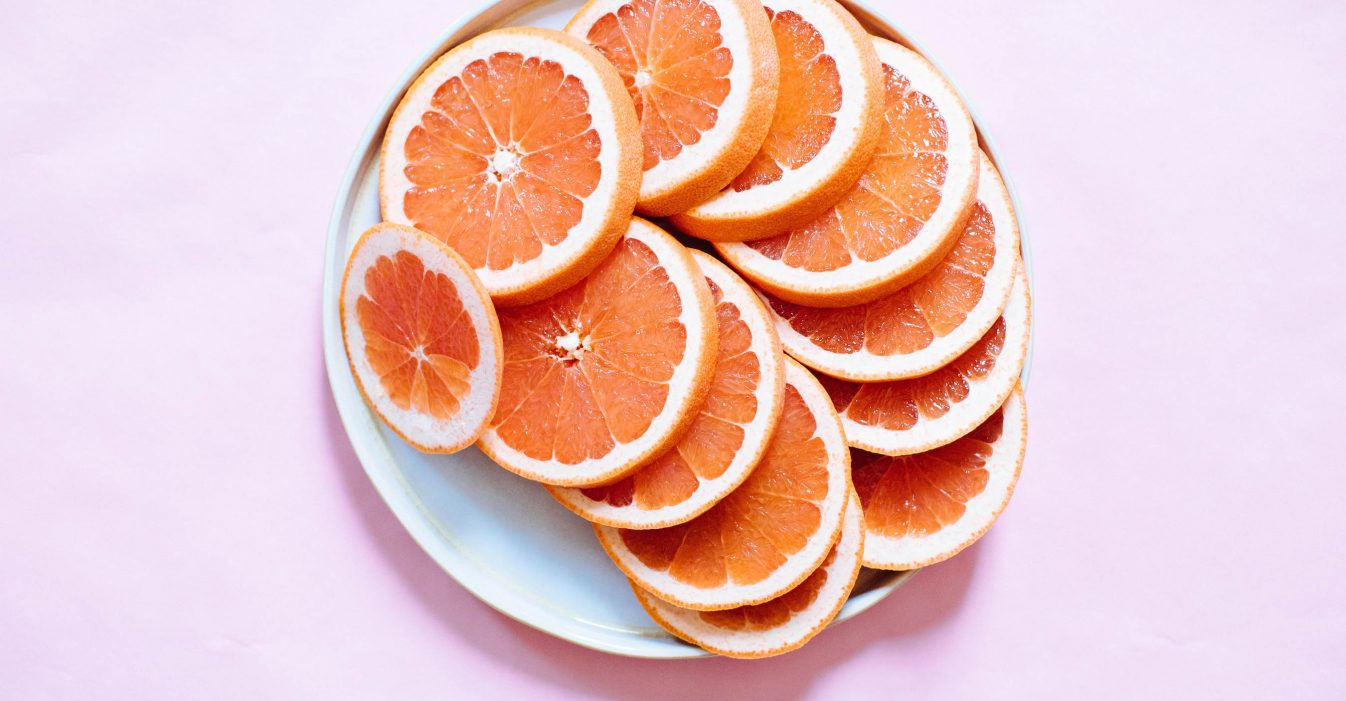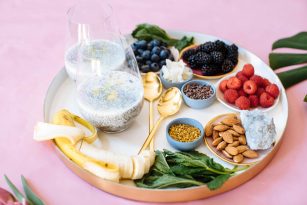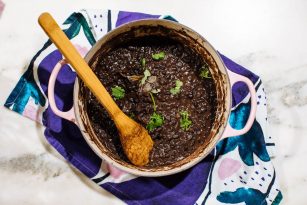Probiotics benefits include nurturing and feeding your gut microbiota and supporting overall digestion.
Probiotic face masks, probiotic shampoo, probiotic tortilla chips (I’m serious, these exist) – probiotics are everywhere. Everything seems to be buzzing in the health food market with the word probiotic, but do these things actually benefit our health and work or are they all hype? Let’s take a look at what the science tells us and what we don’t know/are still researching when it comes to probiotics efficacy.
What Are Probiotics?
Probiotics are the good guys for our digestive system. They’re live microorganisms that live in our gut and provide health benefits to our body — i.e. our digestion. Probiotics help maintain a balance with the natural-occurring bacteria and yeast in our digestive system. If you’ve ever taken a biology or microbiology class, then you could guess how many different strains of bacteria there are in this word, let alone in your gut (it’s a lot!).
Different bacterial strains have been studied in relation to helping ease or improve a certain disease/symptom. For example, lactobacillus is one of the most well-known bacterias (which actually is just the genus, there are many varieties under this umbrella group, i.e. lactobacillus acidophilus). Other types of bacterias include saccharomyces boulardii, Enterococcus faecium, Streptococcus thermophilus, Leuconostoc, and Bifidobacteria.
Probiotics may be helpful for those suffering from allergies, irritable bowel syndrome (IBS), inflammatory bowel disease (IBD), cholesterol, blood pressure, lactose intolerance, chronic gut inflammation, bacterial overgrowths, h. pylori infections, diarrhea, constipation, eczema, and more.
Probiotics work to promote your health by traveling through the colon and interacting with different cells (like immune cells) and nutrients along the way. By doing so, probiotics can help protect the gut barrier andtrigger neurotransmitters that allow for regular digestion.
How Probiotics Influence Gut Health
I first was intrigued by the power of probiotics in aiding diseases/illnesses when studying h.pylori infections in graduate school. I was able to put probiotics to the test personally when I had an ulcer caused by h.pylori in school. A quick primer on what that is — h.pylori is a bacteria that lives within the stomach.
It’s unclear why h.pylori affect some individuals more severely than others. H. pylori manifests in the body with ulcers, inflammation, or even stomach cancer. Some think these infections arise when the immune system is compromised. In my case, I got this the same time I had mono, a real double whammy. Both the diagnosis and treatments are not fun, but probiotics kept me on the treatment plan along with other natural foods/remedies, and I was able to kick it out and heal my gut over a long period of time. Since then I’ve been an advocate for healthy gut ecosystems and healing the gut with as many natural remedies as possible.
Health Benefits of Probiotics
Besides affecting gut health, probiotics can also have positive benefits throughout the rest of your body — mostly because the state of your gut has been shown to influence many other areas of your health. So even if you don’t have digestive issues, you could still benefit from probiotics. Getting more of this good bacteria in your diet can positively influence everything from digestive and vaginal health to mental and heart health.
One clinical trial found that probiotics can help with cognitive function, especially in patients with Alzheimer’s (1). Other research found that probiotics could even help alleviate symptoms of a cold (2).
The Difference Between Probiotics and Antibiotics
Many things may affect gut function including diet, lifestyle, and stress. And if you’ve ever been on antibiotics for an extended period of time, your gut is most likely lacking the army of good bacteria. Antibiotics are anti all bacteria, including both the good and bad bacteria lining your gut.
If antibiotics are fighting off the bad bacteria, guess what? They’re also fighting off the good bacteria colonies as well! Antibiotics are not just found in our prescription medication, but even in the US with our meat/dairy/egg and general factory farming food production. We should be mindful and feed our body with foods that promote healthy gut microflora and a healthy ecosystem. Consuming probiotic-rich foods and a plant-based diet loaded with fruit and vegetable fibers will do this perfectly. In fact, research even says that probiotics can help with antibiotic-related diarrhea, so keep that in mind if you’re experiencing this side effect (3).
Where Can You Find Probiotics?
Probiotics occur naturally in our digestive system already! They’re made from digesting the foods we eat. You can see how this can be an issue for those who don’t consume a diet high in whole foods and rely on the Standard American Diet for their nutrition. Eating highly processed foods, foods that contain antibiotics from meats and dairy (again I’m referring to those not produced on an actual farm with “farmer Joe” taking care of his animals), and foods lacking in fiber are all ways that can negatively impact a healthy gut ecosystem.
Our bodies make probiotics from the foods we eat through prebiotics. Prebiotics are basically the “food” for the bacteria to feed on. They’re indigestible ingredients, and two of the most common forms are inulin and fructo-oligosaccharides (FOS).
Probiotic-Rich Food Sources
Remember that eating a diet rich in prebiotic foods (the foods that are food for probiotics) is important before adding in a high-quality supplement. While it is difficult to tell if fermented foods reach the gut in an activated state and what quantities your body actually accepts, recent research still finds that eating these types of foods is a sound way to promote health, both in your gut and all over (4).
Try this list of fermented foods for naturally occurring sources of probiotics:
- Fermented sauerkraut and fermented pickles: Note that there’s a difference between naturally fermented sauerkraut/pickles/vegetables and the kind you find in a can, loaded with vinegar and salt. The kind loaded with vinegar and salt doesn’t contain the probiotics like fermented varieties do.
- Kimchi, raw or all naturally fermented. You can also make your own!
- Yogurt, all organic dairy or non-dairy alternatives: Be wary of yogurt brands on the grocery store shelves that advertise on fancy celebrity-laden commercials and other marketing tactics to make you believe their product is high in probiotics. Most yogurts don’t contain substantial amounts, let alone reach a billion CFU’s.
- More fermented veggies such as carrots, shredded beets, etc.
- Kefir, organic dairy kefir or coconut water kefir (my favorite)
- Kombucha (aka fermented black tea)
Should You Take a Probiotic Supplement?
Probiotics are also found in supplemental form, varying from the quantity of CFU’s (colony forming units), types (i.e. strains of bacteria), and form (i.e. pill, powder, etc.). Typically when I recommend probiotics to my clients with digestive issues or challenges, I recommend looking for a trusted, reputable company who undergoes third-party testing if possible and has Good Manufacturing Practices (GMP).
You can always use consumerlabs.com to check how pure and potent a supplement is. They’re a great third-party organization/lab who tests supplements in general. The FDA categorizes probiotics as supplements, but that doesn’t mean they’re regulated by the government. So it’s important to look for that third-party label and research where the supplement is coming from.
Some brands I recommend include: Dr. Ohhira’s, Jarrow, and Bio-Kult. Green Vibrance contains probiotics. (I’m not a spokesperson for any of these products, these are just some popular ones and again will change with the needs of the person. Remember that this is a general recommendation and not intended to treat or diagnose any digestive issue.)
Probiotic-Rich Recipes
- Simple Congee Breakfast Porridge
- How to Make Kimchi
- Kale Caesar Salad with Maple Pepper Tempeh
- Sparkling Botanical Ice Cream Float
- OR read up on Should I Take Supplements?
The Bottom Line
I always want to wrap up these nutrition posts with a mini-disclaimer, because in the end, we are all different, especially when talking about our digestive systems. Therefore, the amounts, doses, and strain types may differ among everyone. Just be sure to do your research and check in with your good ole’ doctor. Feel free to contact me if you have specific digestive issues or questions and are need of a new plan. I’d be happy to help!
Let’s Hear from You!
I hope you all enjoyed this nutrition-related post, as I’ve had a lot of requests from the Nutrition Stripped community! Have any more nutrition-related topics you’d like me to cover or other questions about probiotics? Comment below so I know what you’d like covered, or post on social with #nutritionstripped.
References:
- Elmira Akbari, Zatollah Asemi, Reza Daneshvar Kakhaki, Fereshteh Bahmani, Ebrahim Kouchaki, Omid Reza Tamtaji, Gholam Ali Hamidi, Mahmoud Salami. (2106, November) Effect of Probiotic Supplementation on Cognitive Function and Metabolic Status in Alzheimer’s Disease: A Randomized, Double-Blind and Controlled Trial.
- Tracey J. Smith, Diane Rigassio-Radler, Robert Denmark, Timothy Haley, Riva Touger-Decker. (2012, October.) Effect of Lactobacillus rhamnosus LGG® and Bifidobacterium animalis ssp. lactis BB-12® on health-related quality of life in college students affected by upper respiratory infections.
-
Hempel S, Newberry SJ, Maher AR, Wang Z, Miles JN, Shanman R, Johnsen B, Shekelle PG. (2012, May.) Probiotics for the prevention and treatment of antibiotic-associated diarrhea: a systematic review and meta-analysis.
- Maria L Marco, Dustin Heeney, Sylvie Binda, Christopher J Cifelli, Paul D Cotter, Benoit Foligne, Michael Ganzle, Remco Kort, Gonca Pasin, Anne Pihlanto, Eddy J Smid, and Robert Hutkins. (2017.) Health benefits of fermented foods: microbiota and beyond.







